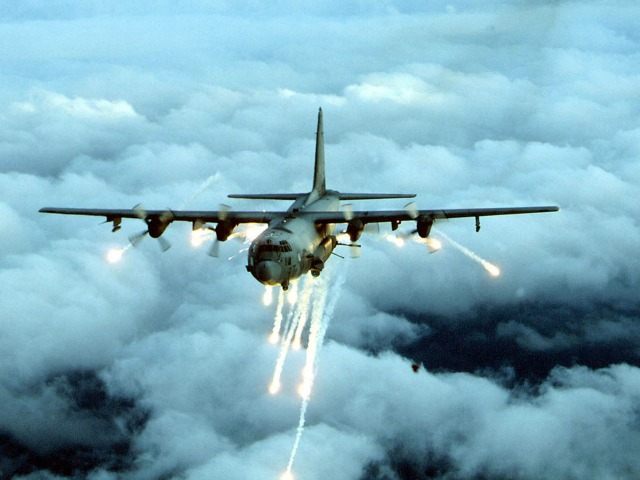U.S. warplanes hit 116 Islamic State (ISIS/ISIL) fuel trucks in eastern Syria, the latest move of an intensifying campaign to damage oil facilities that generate an estimated $1.4 million for the jihadist group.
“The strike conducted Sunday and announced Monday was the first of its kind in more than a year of U.S.-led airstrikes in Syria,” reports The Associated Press (AP). “Four A-10 Thunderbolt II attack planes and two AC-130 Spectre gunships pounded the trucks as they clustered near Abu Kamal, a town close to the Iraqi border.”
In a statement issued Monday, the U.S.-led coalition said the ISIS trucks were destroyed near the eastern city of Abu Kamal in one of 23 allied strikes launched against ISIS.
“Abu Kamal is in Syria’s eastern Syrian Dayr Az Zawr region, which the Pentagon has said provides Islamic State with about two-thirds of its oil revenue, one of the largest sources of income for the militant group,” notes Reuters.
U.S. officials had said they avoided destroying fuel trucks out of concern for civilian casualties.
“Navy Capt. Jeff Davis, a Pentagon spokesman, said that in an effort to warn the truck drivers to leave the area in advance of Sunday’s attacks, leaflets were dropped and coalition planes conducted low-level ‘show of force’ flights over the site,” reports AP.
“Davis said the coalition had determined that more needed to be done to inhibit the Islamic State’s generation of oil revenues in Syria and Iraq,” adds the report.
ISIS earned about $1 million per day from illegal oil sales last year, estimated the Treasury Department. The Pentagon believes that figure has increased to about $1.4 million a day. Some estimates outside of the U.S. government suggest the group is making up to $3 million daily from illicit oil sales.
“This part of it was designed to attack the distribution component of ISIL’s oil smuggling operation,” Davis told AP, referring to destroying the fuel trucks. “ISIL is stealing oil from the people of Iraq and Syria to fund its campaign of terror.”
The attacks were part of a broader U.S.-led coalition operation to cripple a key source of illicit income for ISIS.
It would take “some time” to fully realize the long-term effects of destroying essential components of the jihadist group’s oil network, reportedly said Davis.
“In the short term we know we are disrupting a significant source of funding that’s being used to kill innocent people,” he added.
Sunday’s strikes were planned before the Paris attacks for which ISIS has claimed responsibility. Pentagon officials say there is no direct connection between to two incidents, reports AP.
Davis said the U.S.-led coalition has been concerned with civilian casualties and has been seeking to limit damage to Syria’s oil resources to preserve them for future generations when asked why the U.S. had waited so long to strike ISIS fuel trucks.
“We’re balancing that with the fact that this revenue is presenting a clear and present threat to Syrians today, in that it’s being converted into funds which are being used for military equipment, which is being used to kill innocent civilians,” he added.
Army Col. Steve Warren, a U.S. military spokesman in Baghdad, told reporters last week that the overall effort against ISIS’ oil infrastructure, dubbed Operation Tidal Wave II, is about 70 percent complete.
The colonel noted that Army Lt. Gen. Sean MacFarland, the top U.S. commander in charge of the anti-ISIS campaign, approved the operation, which was named after a World War II mission–Operation Tidal Wave, carried out against Nazi oil fields in Romania in August 1943.
The U.S.-led coalition carried out nine other strikes near six other Syrian cities, hitting various targets including numerous fighting positions, buildings and tactical units, according to the U.S-led Combined Joint Task Force.
In Iraq, the coalition conducted 13 strikes, striking five tactical units as well as two buildings used by ISIS, weapons caches, and other targets near seven cities.

COMMENTS
Please let us know if you're having issues with commenting.